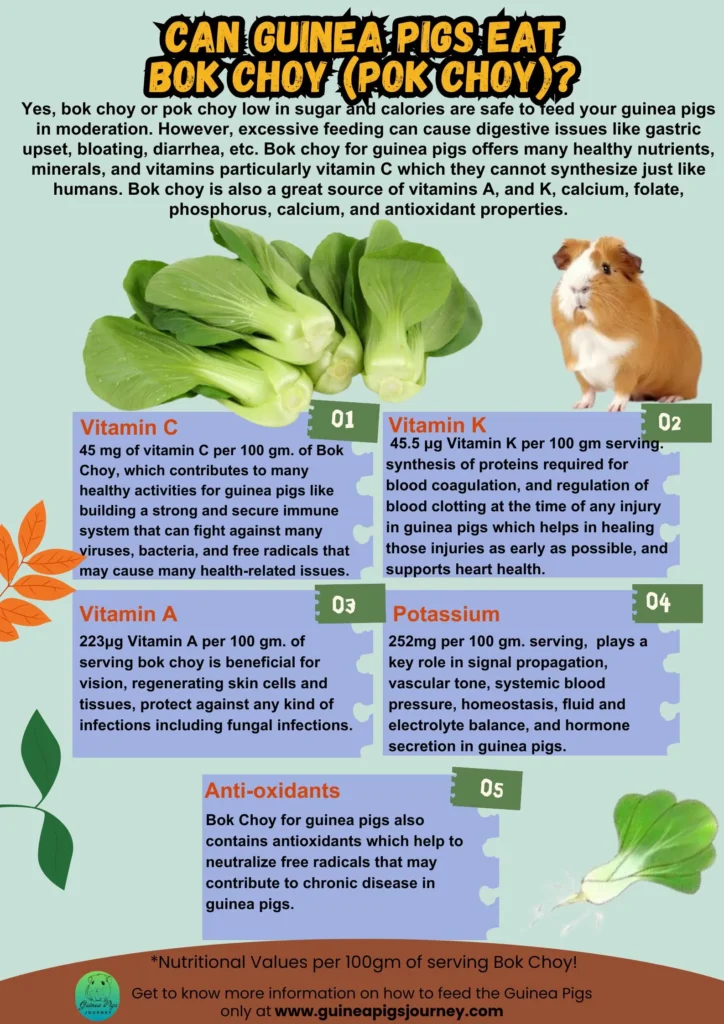Bok choy also known as pok choi or pak choi (British English) or Chinese cabbage is part of the Brassica genus of plants and is native to China. Bok choy is a variety of Chinese white cabbage that falls into the cruciferous vegetable category along with kale, Brussels sprouts, and broccoli. Bok choy contains vitamins, minerals, antioxidants, and fiber.
It has various health benefits, including potentially helping reduce cholesterol levels and promoting strong bones. Such a good food with many benefits raises questions for our little furry friends: Can guinea pigs eat bok choy? And if they can eat bok choy, do they like it? And how often can guinea pigs eat bok choy? Let’s know and understand these questions and more about bok choy for guinea pigs.
Yes, bok choy or pok choy low in sugar and calories are safe to feed your guinea pigs in moderation. However, excessive feeding can cause digestive issues like gastric upset, bloating, diarrhea, etc. Bok choy for guinea pigs offers many healthy nutrients, minerals, and vitamins particularly vitamin C which they cannot synthesize just like humans. Bok choy is also a great source of vitamins A, and K, calcium, folate, phosphorus, calcium, and antioxidant properties.
While bok choy for guinea pigs is a nutrient-dense leafy green beneficial for their overall health and body function, it may also be harmful if fed excessively in large amounts. Bok choy also contains calcium and oxalate, which can contribute to kidney or bladder stone formation if consumed in large quantities. Additionally, raw bok choy contains an enzyme called myrosinase, which may affect thyroid function by preventing the body from absorbing sufficient iodine. So, it is equally important to know about all these nutritional benefits, risks, considerations, and other factors of bok choy for guinea pigs. So let’s ride on a guinea pig journey to make a responsible decision in feeding your guinea pigs.

Nutritional Requirements of Guinea Pigs:
Guinea pigs require a proper diet plan to fulfill their nutritional requirements. The list of safe foods including bok choy that can be fed to guinea pigs is so long that needs great care to know the best way of feeding guinea pigs. But not all foods your guinea pigs eat are safe, like jalapenos peppers, pickles, cheerios, olives, meat, etc.; some are toxic and harmful to their health and digestive system. So, you must also know about those foods not recommended to feed guinea pigs for their safe and healthy life.
In general, Guinea pigs require good and fresh quality hay which makes up 80-90 % of most of their diet along with 10 % of fresh and good quality fruits and vegetables such as sugar snap peas, Swiss chard, asparagus, arugula, dandelions, basil, rosemary, pears, honeydew melon, pomegranate, cherries, plums, dragon fruit, etc. as a treat in moderation.
Guinea pigs can also be served with some amount of only dedicated guinea pig pallets but it should not be part of their main staple and should be served the recommended portion or mentioned on pallets bag for guinea pigs. Guinea pigs should also be served with fresh, clean, chlorine-free drinking water at all times and must be checked and changed twice a day for their good health.
Along with being crunchy and delicious, bok choy is full of fiber, vitamins, minerals, and other nutrients that make it a beneficial addition to your diet. It can also be harmful and dangerous with excessive feeding. So, you must know the nutritional analysis of all parts of bok choy for guinea pigs so that you can decide on the quantity and portion of serving as well as the values and percentage of nutrients available with bok choy for guinea pigs to ensure moderation.
Nutritional Analysis of Bok Choy for Guinea Pigs:
According to the USDA food database, like other dark, leafy greens, it’s full of antioxidants and other compounds that help to promote the better health of your guinea pigs. Listed below are the nutritional values and percentages per 100 grams of raw Chinese cabbage, pak choy, or bok choy for guinea pigs to understand the values and percentages of these important nutrients bok choy for guinea pigs contain and how much bok choy can guinea pigs eat for optimum health benefits.

| Nutrients | Value per 100 grams | Daily Value (DV %) |
| Calories | 13 kcal | |
| Carbohydrates | 2.18 grams | 1 % |
| Water | 95.3 grams | |
| Fat | 0.2 gram | 0 % |
| Protein | 1.5 grams | 3 % |
| Dietary Fiber | 1 grams | 4 % |
| Sugar | 1.18 gram | |
| Ash | 0.8 grams | |
| Net Carbs | 1.18 grams | |
| Vitamin C, total ascorbic acid | 45 mg | 50 % |
| Vitamin A, RAE | 223 µg | 25 % |
| Vitamin K | 45.5 µg | 38 % |
| Vitamin B6 | 0.194 mg | 11 % |
| Vitamin D | 0 mcg | 0 % |
| Cholesterol | 0.00 mg | 0 % |
| Fatty Acid | 0.027 g | 0 % |
| Calcium, Ca | 105 mg | 8 % |
| Phosphorus, P | 37 mg | 3 % |
| Potassium, K | 252 mg | 5 % |
| Iron, Fe | 0.8 mg | 4 % |
| Magnesium, Mg | 19 mg | 5 % |
| Zinc, Zn | 0.19 mg | 2 % |
| Sodium, Na | 65 mg | 3 % |
| Copper, Cu | 0.021 mg | 2 % |
| Folate | 66 µg | 16 % |
Note: * The % Daily Value (DV) indicates how much a nutrient in a serving of food subsidizes a daily diet.
Is Bok Choy Safe For Guinea Pigs?
Yes, bok choy or pok choy is safe to feed your guinea pigs in moderation and with a gradual introduction. Bok hoy low in calories, sugar, and carbohydrates is one of the suitable options in moderation because as we know our little furry friends do not go well with a diet high in sugar, carbohydrates, and calories which can put your piggies at risk for unhealthy weight gain and even obesity.

Being a suitable food, it does not mean that bok choy can be fed excessively to your guinea pigs as it can also be harmful due to a gassy food and calcium and oxalate content which can contribute to digestive issues and formation of bladder and kidney stones. Bok choy can also be allergic if not observed or monitored before and after introducing this leafy green into your guinea pig diet plan.
It is always recommended to monitor or watch for any kind of allergic signs before introducing bok choy into your guinea pig diet. Do not hesitate to give a call to your veterinarian for a review and medical checkup of each guinea pig to maintain a healthy life, especially if they have had problems in the past.
What Are the Nutritional Benefits of Bok Choy For Guinea Pigs?
Bok choy offers many health benefits through its antioxidant and anti-inflammatory properties. It may support cardiovascular and bone health, improving blood sugar control, boosting immunity promoting heart health, etc. while potentially reducing the risk of certain types of cancer. Let’s know what type of nutrients and their benefits bok choy contains for guinea pigs.

Vitamin C:
Bok Choy for guinea pigs contains 45 mg of vitamin C per 100-gram serving of bok choy beneficial for boosting the immune system of your guinea pigs and can fight against many viruses and bacteria to keep guinea pigs safe and healthy. Vitamin C is a very necessary element for guinea pigs which they cannot synthesize, helping them to prevent a dangerous disease called scurvy in guinea pigs which may even lead to malnutrition.
Vitamin A:
Bok Choy for guinea pigs contains 223 µgof vitamin A per 100-gram serving of bok choy which is beneficial for the development of skin cells and tissues along with eyesight development. Guinea pigs require vitamin A, especially in times of any type of injury so that their tissues and cells can be repaired as early as possible. Vitamin A for guinea pigs also helps to protect against the free radicals which can cause many diseases including cancer in guinea pigs.
Potassium:
Potassium helps to create proteins and carbohydrates in humans as well as in guinea pigs and regulates the heartbeat and oxygen support for guinea pigs. It also maintains the good health of nerves and muscles to function properly whatever stage guinea pigs are. Chok Boy for guinea pigs contains 252 mg of potassium per 100-gram serving of bok choy.
Promote Bone Health:
Bok choy has many important minerals like calcium, phosphorus, vitamin K, iron, and zinc can help maintain the bone health of your guinea pigs. Zinc plays a significant role in the production of collagen, a protein found in the joints and skeletal system necessary for bone strength and structure.
Support Heart Health:
Bok choy helps to reduce the risk of developing cardiovascular disease in guinea pigs. This leafy green vegetable, bok choy contains potassium, magnesium, and calcium, all minerals that play a role in regulating blood pressure in guinea pigs. Some research has found that consuming leafy green vegetables is linked to a lower frequency of cardiovascular disease and a favorable approach for preventing cardiovascular disease actions.
What Are The Risks Of Bok Choy For Guinea Pigs?

Risk of Bladder and Kidney Stones:
Calcium is also an important element for the guinea pigs’ bone strength and Bok choy offers a highly absorbable form of calcium. But calcium in excess if consumed by guinea pigs may also contribute to the formation of bladder stones. Bok choy also contains traces of oxalate which can contribute to the formation of kidney stones which can be painful for your guinea pigs’ overall health.
Calcium-to-Phosphorus Ratio:
The calcium to phosphorus ratio is also very important which if not maintained can lead to dangerous developmental problems and cause painful calcium phosphate deposits in joints. So, moderation while feeding bok choy or any other new food high in calcium is very crucial. The recommended ratio of calcium to phosphorus is at least 1.5:1 and 2:1. The figure for bok choy is 2.84: 1
Bloating:
Crucifers (brassicas) vegetables like kale, broccoli, Brussels sprouts, bok choy, etc. contribute to gas and bloating. So it is recommended to feed your guinea pigs in a limited quantity to avoid such complications.
Allergic Reaction:
Watch out for any kind of possible allergic reaction before and after feeding Bok Choy that can cause discomfort due to bok choy for guinea pigs. It is very important for guinea parents to consult a vet before introducing any new food or leafy green like bok choy to guinea pigs’ diet and always monitor the reaction or any change in guinea pig’s behavior if you introduce any new food to the guinea diet, then immediately contact your veterinarian for further guidance.
How Often Can Guinea Pigs Eat Bok Choy? (Frequency and Size of Serving Bok Choy)

While bok choy offers several health benefits for guinea pigs, it may also come with downsides for some guinea pigs when consumed in large amounts. So it is very crucial to ensure moderation while offering bok choy to your guinea pigs.
The recommended frequency for serving bok choy is sparingly not more than two or three times a week per guinea pig in moderation as a key for varied and accurate measurement diet. Bok choy should be introduced gradually, carefully, and infrequently to avoid digestive upset and other serious health-related issues as explained above.
How Much Bok Choy Can Guinea Pigs Eat?
The recommended portion and size of bok choy for guinea pigs is about two or three small leaves per guinea pig at a time to sprinkle or mix up a little with other safe leafy greens or veggies as a treat but ensure the moderation, your guinea will love to enjoy the bok choy treat containing important micronutrients beneficial for guinea pigs.
You can also serve them ½ amount in the morning and the other half in the evening so that they can digest it easily and adjust it into their diet to ensure a gradual introduction.

Can Guinea Pigs Eat Bok Choy Every Day?
No, it is not recommended to offer bok choy every day in guinea pigs’ diet due to the decent amount of sodium, calcium, and oxalate content contributing to bloating and bladder or kidney stones. Bok choy should not be part of your guinea pigs’ main staple it should be fed in moderation to ensure safety and promote good health.

Can Guinea Pigs Eat Bok Choy Salad?
Yes, you can feed bok choy salad by mixing it with other high-in vitamin C, low-in calcium, fresh and suitable leafy greens or veggies like arugula, mustard greens, green beans, basil, zucchini, wheatgrass, parsley, romaine lettuce, radicchio, etc. to add variety and nutritional boost as an occasional treat to ensure moderation and gradual introduction.

What Part Of Bok Choy Can Guinea Pigs Eat?
Bok Choy is a nutrient-dense leafy green for guinea pigs and offers numerous health benefits. After knowing the frequency and size of serving bok choy for guinea pigs, it is now very important to know the types and parts of bok choy safe to offer your guinea pigs.
Can Guinea Pigs Eat Bok Choy Leaves?
Yes, bok choy leaves are safe to feed your guinea pigs in moderation which offers many healthy micronutrients to your guinea pigs’ overall health. Bok choy leaves contain most of the nutritional values but excessive feeding can cause digestive issues like bloating, diarrhea, etc.
Can Guinea Pigs Eat Bok Choy Stems?
Yes, guinea pigs can eat the stems of bok choy in moderation, it’s a non-heading cabbage that has thick crunchy white stems which adds additional nutritional benefits like fiber, important antioxidants, and other nutrients beneficial for your guinea pigs.

Can Guinea Pigs Eat Bok Choy Seeds?
No, bok choy seeds are not recommended to feed your guinea pigs as they can choke on your guinea pigs causing hazardous situations, so it is better to avoid them. Bok choy seeds are so small and hard that can be stuck into your guinea pigs’ teeth and harm their teeth and gums while chewing. Seeds are also not much more nutritious for your guinea pigs and other alternatives can be served to your furry friends.
Can Guinea Pigs Eat Bok Choy Root End?
Yes, guinea pigs can eat the root end of bok choy as it is edible and safe to feed them in moderation offering healthy micronutrients and health benefits.
Can Guinea Pigs Eat Bok Choy Roots?
Yes, the roots of bok choy are edible and safe to feed your guinea pigs in moderation, but it is very important to wash it properly in cold running water to remove the dust, pesticides, and chemicals to avoid any kind of digestive upset and health-related complications.
Can Guinea Pigs Eat Shanghai Bok Choy?
Yes, Shanghai bok choy is safe to feed your guinea pigs in moderation offering many healthy nutrients. Shanghai bok choy is low in calories, sugar, and carbohydrates due to which guinea pigs can perform their body functions very easily. Shanghai bok choy is also a good source of vitamins C, A, & K as well as some important minerals.
Can Guinea Pigs Eat Dwarf Bok Choy?
Yes, dwarf bok choy is safe to feed your guinea pigs in moderation. Dwarf bok chor offers many healthy nutrients for guinea pigs.
Can Guinea Pigs Eat Cooked or Processed Bok CHoy?
No, do not feed your guinea pigs cooked or processed bok Choy because it contains seasonings, salts, oil, etc. which can be harmful to guinea pigs’ digestive system causing stomach upset, bloating, vomiting, etc. It is recommended to serve fresh, raw, and organically produced bok choy for guinea pigs in moderation.
Alternatives of Bok Choy for Guinea Pigs:
Although guinea pigs enjoy leafy greens like bok choy in their diet and there must be healthy alternatives to fulfill nutritional requirements because they may also dislike this leafy green or may be allergic to it. Listed below are some alternatives to bok choy for guinea pigs.

| Cabbage | Tomato | Green beans, raw |
| Collard greens | Celery | Blackberries |
| Romaine Lettuce (Avoid Icebergs) | Parsnips | Sweet Potato |
| Pumpkin Seeds | Beets | Artichoke |
| Brussel sprouts | Carrot | Jicama |
| Kale, raw | Bell pepper | Cilantro |
| Arugula, raw | Wheatgrass | Pears |
| Parsley | Zucchini | Spinach |
| Dandelion greens, raw | Pomegranate | Turnip greens, raw |
| Beet greens, raw | Nectarines | Grapefruit |
| Honeydew | Mushrooms | Butternut Squash |
Conclusion: Bok Choy for Guinea Pigs
Overall, it is OK to feed bok choy to your guinea pigs but moderation and gradual introduction is the key to serving because bok choy contains a decent amount of oxalate, calcium, and acidic properties which can be dangerous for your guinea pigs’ digestive system causing bloating as well as bladder or kidney stones. Bok Choy should be served as an occasional treat but not a daily or regular part of their diet but ensuring small quantity is very important. Bok Choy can add variety and nutritional boost in guinea pigs diet and overfeeding can lead to numerous health issues affecting their overall health.







